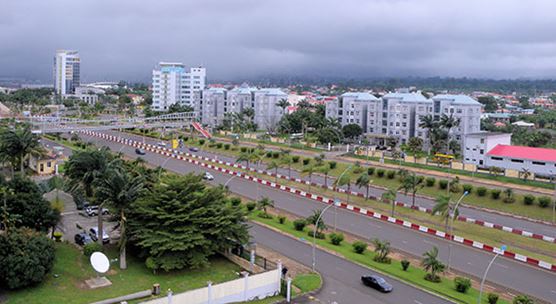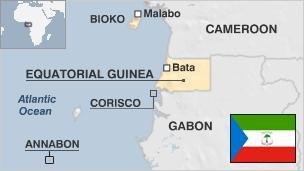
Motorway of Malabo, capital of Equatorial Guinea. The country's new program has a strong emphasis on strengthening governance and fighting corruption (photo: mtcurado/iStock by Getty Images)
Equatorial Guinea: Promoting Inclusive Growth, Improving Governance and Transparency
December 18, 2019
The IMF has agreed a program with Equatorial Guinea worth around $283 million, which will have governance and anti-corruption reforms at its heart. The agreement aims to support the recovery of the economy, which has been contracting for the past six years, and promote sustainable and inclusive growth.
Related Links
In an interview, Lisandro Abrego, the IMF’s mission chief for Equatorial Guinea, discusses some details of the program.
What is the background to the IMF’s approval of the loan to Equatorial Guinea?
The journey to program approval has been long and challenging. The entire process took about 2½ years to conclude reflecting the severe challenges faced by Equatorial Guinea in recent years. The country has faced successive years of strong decline in hydrocarbon output and a contracting non-oil sector.
The process began in mid-2017 and involved a staff-monitored program (SMP) agreed in 2018, which was the basis for discussions on a Fund-supported program. This was an important step because it enabled Equatorial Guinea to establish a track record of policy implementation. The SMP then opened the way to negotiations for a three-year program under the IMF’s Extended Fund Facility (EFF), designed to help countries implement medium-term structural reforms.
Could you tell us more about the focus of the program?
 The program’s main objective is to support the recovery of the country’s
economy, and promote sustainable and inclusive economic growth. We want to
strengthen the country’s macroeconomic and financial stability, improve
social protection and promote human capital development. The program also promotes economic diversification, while improving governance and
supporting the fight against corruption. The latter is a key program
component and involves the implementation of a "Good Governance and Anti-Corruption Action Plan" that was adopted and published by the authorities.
The program’s main objective is to support the recovery of the country’s
economy, and promote sustainable and inclusive economic growth. We want to
strengthen the country’s macroeconomic and financial stability, improve
social protection and promote human capital development. The program also promotes economic diversification, while improving governance and
supporting the fight against corruption. The latter is a key program
component and involves the implementation of a "Good Governance and Anti-Corruption Action Plan" that was adopted and published by the authorities. The program intends to strengthen public finances by reducing inefficient spending, increasing non-resource tax revenue, and improving public financial management. It also increases the space for social spending. In addition, the program includes several measures to improve the business climate and other reforms required to support economic diversification.
Fast Facts
- Real GDP growth (2019): -5.9%
- Inflation rate Q3 (2019): 1.3%
- Population: 1.36 million
- Income per capita
(PPP based): $19,513 - Human Development Index rank: 141
- Life expectancy at
birth: 57.9 - Expected years of schooling: 9.3
How does the Fund explain a program with Equatorial Guinea, given its track record of weak governance?
Equatorial Guinea, like all Fund members, can request support to reestablish macroeconomic stability. At the same time, we recognize Equatorial Guinea’s longstanding governance and corruption challenges and the EFF-supported program seeks to address these in a manner consistent with the IMF’s 2018 Framework for Enhanced Fund Engagement on Governance.
Measures to improve governance and address corruption were also an important part of the 2018 Staff Monitoring Program. The new program broadens and deepens these reforms. Equatorial Guinea has adopted a plan to improve governance and fight corruption. Key objectives of the plan include more transparency in the hydrocarbon sector, strengthening public financial management, implementing an anti-corruption framework, strengthening contract enforcement and property rights, and upgrading the anti-money laundering framework.
Could you elaborate on the anti-corruption framework?
Improvements in the anti-corruption framework would include the adoption of an anti-corruption law covering conflicts of interest and asset declarations by senior public officials, enhancing enforcement, and strengthening international cooperation. On transparency, the program requires implementing measures consistent with the Extractive Industries Transparency Initiative standard, such as audits of state-owned hydrocarbon companies and their publication, regular publication of data and other relevant information on the hydrocarbon sector, and making companies established in Equatorial Guinea more transparent by publishing their beneficial ownership information.
Equatorial Guinea’s application to join the Extractive Industries Transparency Initiative, which we are supporting, was one of the “prior actions” that the authorities needed to fulfill before the IMF Board considered their program request. Other measures, which needed to be completed in advance, include the adoption and publication of an action plan to improve transparency and governance, and fight corruption, the establishment of a system to adequately track and control government spending, and finally, presenting to parliament a budget for 2020 that is consistent with program targets.
My mission team and I will be reporting regularly to the Fund’s Executive Board, which has taken a keen interest in the program, given the focus on governance. The Board reviews will be held semi-annually, and their completion will depend on the performance of the program, notably the implementation, as agreed, of key governance and anti-corruption measures.







